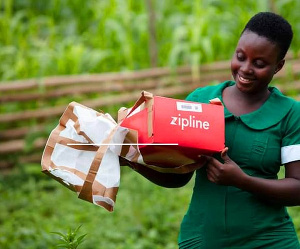Health News of Friday, 4 February 2022
Source: Melvin Tarlue, Contributor
Zipline and other stakeholders commended for efforts in improving maternal healthcare delivery in Ghana
The Ghana Health Service (GHS) has attributed strengthened public-private partnerships and community engagement as contributing to positive outcomes in the delivery of critical maternal, newborn, and child health services.
While commending the impact of collaboration between GHS and private sector players like Zipline, the Director-General of the GHS, Dr. Patrick Aboagye Kuma, highlights that the country has in recent years registered an improvement in outcomes of maternal healthcare.
Ghana Health Service (GHS) indicates that 875 maternal deaths were recorded in 2018 and 838 in 2019. This figure further decreased to 776 in 2020 despite the increase in deliveries while institutional maternal mortality ratio reduced from 117 in 2019 to 106 in 2020, amidst the COVID-19 pandemic and all its associated impact.
During the Maternal, Child Health conference, GHS called for strenuous efforts to achieve the sustainable development goal target of 70 per 100,000 live births in 2030. GHS noted that the recent decrease in maternal mortality can be attributed to measures such as increased partnerships, which have resulted in the delivery of essential maternal medications and medical supplies to health outposts via drones.
Dr. Patrick Aboagye Kuma emphasized that there has been a steady decline in maternal deaths and an improvement in maternal healthcare delivery since Zipline rolled out its rapid delivery system in the GHS supply chain processes.
On the heels of concerns in the past about the growing number of maternal deaths in the country, the government moved to initiate measures to curtail the growing trend. Top among the priorities was to link health facilities, especially those in remote areas to child and maternal medications.

Following successful works in Rwanda, Zipline was engaged as the special purpose vehicle to facilitate the decentralisation of medical health. The company has since 2021, delivered 16,627 pregnancy category medications and has on countless occasions flown critical medical supplies to save pregnant women from intrauterine deaths.
Naa Yawson, the General Manager of Zipline indicated that following the advancements in healthcare delivery, it was necessary for Ghana to wean itself of maternal deaths, by improving access to maternal healthcare delivery. She further extended her appreciation to all stakeholders for recognizing the impact of the drone service in addressing maternal healthcare challenges.
“Zipline has been contributing to improved access to quality maternal healthcare in Ghana by providing solutions to emergency interventions such as intrauterine foetal death (dead baby in the uterus), low haemoglobin in pregnant women, and ectopic pregnancy. We are therefore excited to be identified as an integral partner in helping the Government reduce maternal mortality in Ghana,” said Mrs. Yawson.
Zipline has hinted that it will continue to carry out the needed expansion to ensure that more people in critical need of medical and blood products are serviced, regardless of location.
Entertainment










